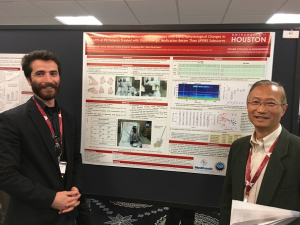Research proposes computer-based assessment of Parkinson’s patients more reliable
Musa Ozturk, a Ph.D. student in biomedical engineering at the UH Cullen College of Engineering, presented a poster at the Neuromodulation Symposium at the University of Minnesota and won second place out of 120 presentations.
Neuromodulation, a rapidly-growing field, encompasses a broad range of implantable and non-invasive technology-based approaches for the treatment of neurological and psychiatric disorders.
The poster focused on assessing the measurement methods for symptom severity in patients with Parkinson's disease.
“We asked the patients participating in the study to perform a computer based keyboard typing task and compared that to the standard clinical assessment method called UPDRS (Unified Parkinson's Disease Rating Scale), which is performed manually by a clinician,” Ozturk said.
“Patients went through both assessment methods before and after taking their medication,” he said. “In the meantime, we recorded the neural activity called Local Field Potentials from subthalamic nucleus of a patient's brain using deep brain stimulation electrodes.”
The student research team found that the computer-based keyboard task explained the improvement in patients' symptoms better than UPDRS when compared to spatio-spectral changes in the neural activity.
“Therefore, we argued that the clinician assessed method – which is the longtime clinical standard – might be affected by human error or bias,” he said, adding that it could potentially be replaced with a computer-based task to improve objectivity and reliability.
The traditionally accepted method could also lead to variability between hospitals and neuroscience centers around the world. “Using a more objective method for assessing symptoms will help keep patients' symptom severity and relevant scientific findings comparable across the field,” Ozturk said.
The study was conducted under supervision of Nuri Ince, assistant professor of biomedical engineering and director of the Clinical Neural Engineering Lab at the Cullen College, and his collaborator Dr. Aviva Abosch, who also performed the surgeries.
The symposium, organized by the Institute for Engineering in Medicine (IEM) and MnDRIVE Brain Conditions (a partnership between the University of Minnesota and the State of Minnesota), aims to bring together scientists, engineers, clinicians, industrial practitioners and entrepreneurs to advance the field of neuromodulation.
